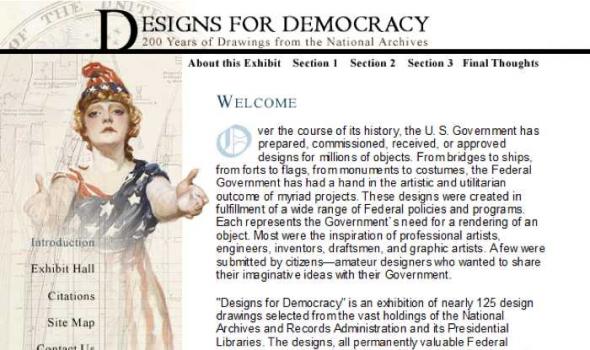Category: Arts & Humanities, Text, The U.S. National Archives and Records Administration
Results
What’s Cooking Uncle Sam? An Exhibition at the National Archives through January 3, 2012 Food. We love it, fear it, and obsess about it. We demand that our Government ensure that it is safe, cheap, and abundant. In response, Government has been a factor in the production, regulation, research, innovation, and economics of our food supply. It has also attempted, with varying success, to change the eating habits of Americans. From the farm to the dinner table, explore the records of the National Archives that trace the Government’s effect on what Americans eat.
The President's Daily Diary: November 22, 1963 - January 20, 1969 The secretaries outside the Oval Office prepared President Johnson's Daily Diary. Juanita Roberts, the President's personal secretary, assigned the responsibility of preparing the Diary to secretaries in the office. A particular person would "work" the Diary for a scheduled period. As visits and telephone calls occurred, the secretary "working" the Diary would note them; occasionally the secretary missed noting a call or meeting. White House staff who worked closely with the President frequently entered the Oval Office without the visit being noted in the Diary.
Guns, tanks, and bombs were the principal weapons of World War II, but there were other, more subtle forms of warfare as well. Words, posters, and films waged a constant battle for the hearts and minds of the American citizenry just as surely as military weapons engaged the enemy. Persuading the American public became a wartime industry, almost as important as the manufacturing of bullets and planes. The Government launched an aggressive propaganda campaign with clearly articulated goals and strategies to galvanize public support, and it recruited some of the nation's foremost intellectuals, artists, and filmmakers to wage the war on that front.
Inside the National Archives Southeast Region 1. Welcome The Southeast Region of the National Archives holds in trust original records documenting the settlement and development of a unique section of the United States. It maintains historical records from regional offices of Federal agencies in Alabama, Florida, Georgia, Kentucky, Mississippi, North Carolina, South Carolina, and Tennessee. These records are the documentary evidence of day-to-day occurrences that have become part of our history. This presentation highlights treasures in the region's holdings. It tells intriguing stories of the people who once inhabited this land. Some documents are about famous people and events.
Federal Designs: Symbolism Symbols are an important part of America`s design heritage. They establish and reinforce the national identity and patriotism. In some cases, American symbols are based on recognized associations. The ideals of Greek democracy, the power of Imperial Rome, or the refinements of European fashion frequently are reflected in Federal designs. At other times and for other purposes, designers created icons using images unique to this new country, to this new form of government, and to America`s aspirations to world power.
Dear Bess: Love Letters from the President "Dear Bess: Love Letters from the President" February 12, 1998 through September 1, 1999 Garden Room, Truman Library & Museum The Harry S. Truman Library and Museum is one of thirteen Presidential Libraries administered by the National Archives and Records Administration . 500 W. US Hwy. 24. Independence MO 64050 truman.library@nara.gov ; Phone: 816-268-8200 or 1-800-833-1225; Fax: 816-268-8295.
During the depths of the Great Depression of the 1930s and into the early years of World War II, the Federal government supported the arts in unprecedented ways. For 11 years, between 1933 and 1943, federal tax dollars employed artists, musicians, actors, writers, photographers, and dancers. Never before or since has our government so extensively sponsored the arts. MORE... This link is not functional because your browser does not support JavaScript or Javascript has been disabled. Please use this link to MORE...


























